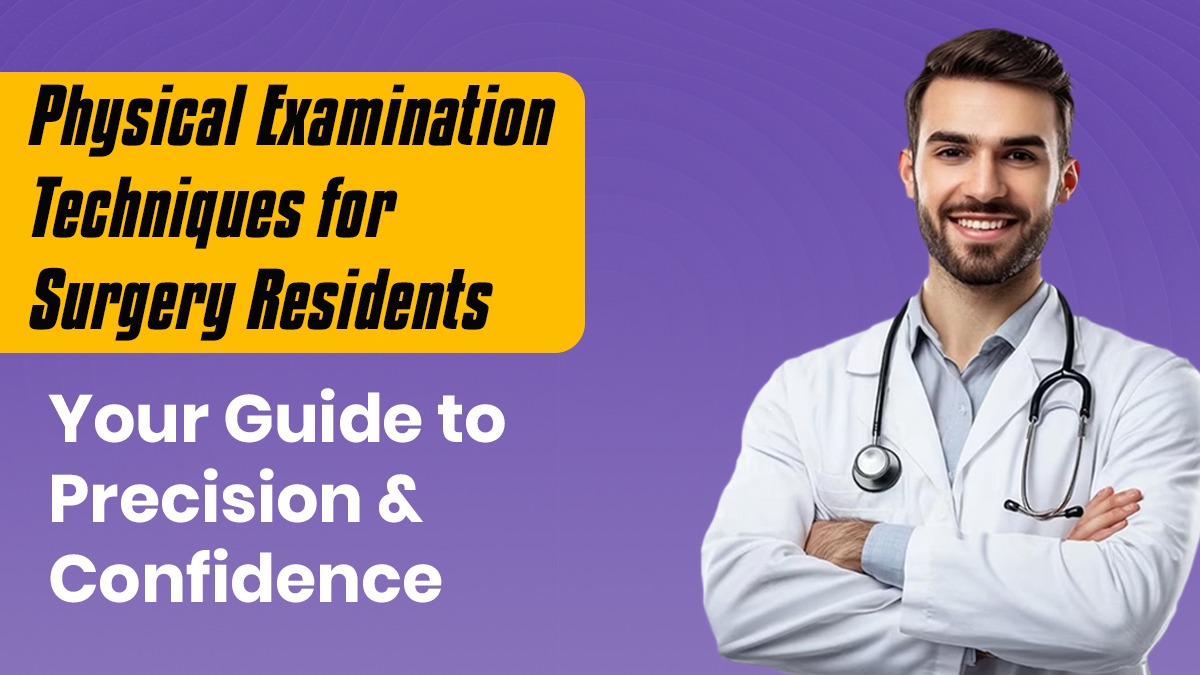Estimated reading time: 4 minutes
Learning clinical examination techniques is not only a requirement of the surgery residency program but these skills make a difference in patient care. Such skills enable surgery residents to have essential insight into a patient’s status regarding his or her disease, and they point the way toward decisions in treatment and successful surgical results.
In this blog, we will break down some of the basic clinical examination techniques used in most general surgery residency programs and give you clear explanations to make them accessible and practical for your everyday work.
Key Clinical Examination Techniques for General Surgery Programs
Every step in the clinical examination process is crucial for patient assessment and management. Here we cover the core techniques that every general surgery resident should know.
1. Inspection
This is the first and most commonly illustrative step of a clinical examination, in which basic preliminary information about the general health of a patient can be obtained just by inspecting, and looking at the patient’s skin condition, visible abnormalities, or other signs indicating possible issues. In general, in surgical residency programs, perfecting this skill of observation is foundational because it leads to informed hypotheses concerning a patient’s condition even before further examination begins.
2. Palpation
Palpation is the technique of using the hands to feel the structures underneath the skin. This helps general surgery residents to identify problems such as tenderness, swelling, masses, or abnormal growths. Palpation can show where structures are located, how big they are, this helps in determining what should be done next in the treatment process. General surgery programs emphasize palpation as a technique to determine both visible and deep-seated abnormalities hence this is skill that residents continually perfect during general surgeon residency training .
3.Percussion
Percussion involves tapping on certain body parts to determine the underlying structures and the sounds produced. It is very informative in examining organs such as the lungs, liver, or abdomen since various tones may indicate fluid accumulation, organ enlargement, or presence of air pockets. General surgery residents benefit early in their training by developing percussion skills. The ability to make quick and informed decisions comes with increasing one’s diagnostic precision.
4. Auscultation
Auscultation involves the listening to internal sounds within a body, usually with the use of a stethoscope. This will allow surgery residents to listen to the heart, lungs, and even bowel sounds so they obtain an impression of the state of health of the organs and how well they are functioning. Auscultation can assist in picking out anomalies such as the existence of murmurs, crackles, or any other sounds that might give a glimpse into the hidden pathology.
These are techniques that can really hone a resident’s diagnostic skills and create an element of confidence when making even the most intimidating decisions in life for your patients. Many surgical residency programs impart these skills on the residents and encourage them to practice hands-on so they are well-equipped when addressing the real challenges of the clinic.
Why Conceptual Surgery is the Best Learning Platform for Surgery Residents?
If you are one of the surgery residency candidates who have been planning to enhance surgical practices, then Conceptual Surgery is the best learning platform for you. Conceptual Surgery Offers real-life case studies, and helps a resident establish a firm foundation in important skills such as clinical examination techniques.
Conceptual Surgery‘s curriculum extends beyond the simple teaching of techniques, it creates an environment that promotes critical thinking and problem-solving. Conceptual Surgery bridges the gap between classroom learning and the demands of clinical practice with its resources tailored toward residents in general surgery, with access to live lectures, in-depth surgical demonstrations, and even interactive Q&A sessions.
Our aim is to help general surgery residents, among other surgical specialists, feel empowered and ready as they move through their residency and into independent practice.
Join us today and discover what our latest plan, and practical training makes for you in general surgery training. This is your chance to hone your clinical skills.
So are you finally ready to take your surgical journey to the next level? Click on this link to learn more about Conceptual Surgery’s programs!

